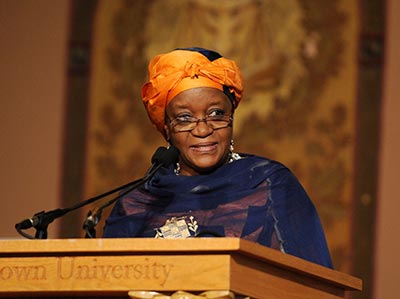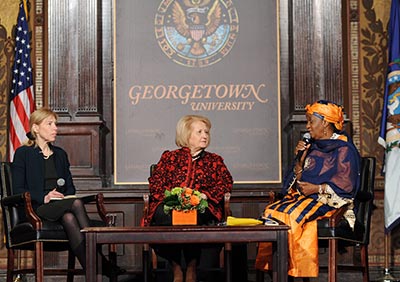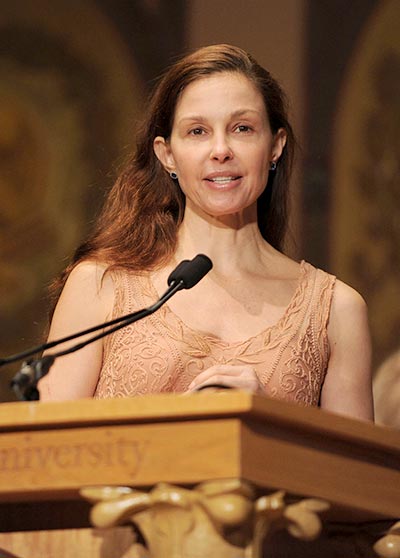Title: U.N. Official, Journalist Awarded for Exposing Violent Extremism
A United Nations official delivers talk about preventing sexual violence as a weapon of war and receives prestigious award along with New York Times journalist for contributions toward women’s global peace and security.
Women often are the first and worst affected when conflict and terrorism surface within their own environments or the ones to which they flee, U.N. official Zainab Bangura said during her visit to Georgetown yesterday.

Zainab Bangura
“In the contemporary theater of conflict, women and girls find themselves under assault every day … whether at border crossing, checkpoints, during house searches, in detention centers and in the very camps or settlements where they seek refuge,” said Bangura, the U.N. Special Representative of the Secretary-General on Sexual Violence in Conflict.
Global Future of Security
Bangura delivered her address on “Human Security in the Face of Violent Extremism” yesterday before receiving this year’s Hillary Rodham Clinton Award for Advancing Women in Peace and Security.
The talk is a part of a semester-long focus on global security by the university’s Global Futures Initiative and was co-sponsored by the Georgetown Institute for Women, Peace and Security (GIWPS), the Berkley Center for Religion, Peace and World Affairs and Georgetown’s President’s Office.
The ‘Greatest Challenge’
Bangura has used her position to highlight the brutality exacted on women and girls in conflict, demand accountability from perpetrators from the grassroots to the highest levels of government, and call for reparations for victims.
“Perhaps the greatest challenge in relation to an atrocity like conflict-related sexual violence is moving from a long history of justice delayed and justice denied to justice delivered, and from a culture of impunity to a culture of deterrents,” Bangura added.
She was joined after her address for a talk with Alissa Rubin, Paris bureau chief ofThe New York Times, and moderator Melanne Verveer, GIWPS executive director. Actress and activist Ashley Judd provided closing remarks.
Global Trailblazers

Alissa Rubin, Paris bureau chief ofThe New York Times, and Melanne Verveer, GIWPS executive director, join Zainab Bangura for a discussion on the dangers women face in areas of conflict.
Like Bangura, Rubin received an award for her work to expose extremist violence globally. GIWPS presented her with the 2016 Global Trailblazer Award.
Rubin has traveled to dangerous warzones, often risking her life to document and report on injustice. She also has shed light on the atrocities being committed by ISIS against the Yazidi population, and her work helps to ensure that women’s experiences during war do not go unheard.
“One of the things that you do as a reporter is to try to be honest about the confusing facts, because the facts almost always are confusing,” Rubin said. “Whether it’s journalists or [nongovernmental organizations] or diplomats…[it’s important] to have them going to places and talking to the people on the ground who are going through it and listening even to improbable stories.”
GIWPS began awarding the Hillary Rodham Clinton Award for Advancing Women in Peace and Security and the Global Trailblazer Award in 2014 to honor today’s champions and inspire the next generation of global leaders.
“Zainab Bangura and Alissa Rubin are true trailblazers in the global effort to highlight and combat sexual violence as a tactic of war,” Verveer said. “As addressing sexual violence becomes a greater priority in policies to counter violent extremism, the work of these two women will play a key role in enhancing our understanding of the vulnerabilities and capacities of women globally.”
Global Gender Justice

Actress and activist Ashley Judd provides closing remarks.
The event is part of Georgetown’s broader commitment to global gender justice.
“We are deeply aware that incidences of violent extremism occurring in conflict zones and in civil societies across our world pose a threat to basic human rights and security,” said Georgetown President John J. DeGioia. “We also know that women too often bear a disproportionate burden in the face of these incidents and challenges.”
Judd closed the event by reminding the audience about the importance of the work being done by individuals such as Bangura and Rubin.
“It does take a personal willingness to lean in to personal and vicarious trauma,” she said. “…To have the personal stamina to continue to do this work is a considerable spiritual achievement.”
The next Global Futures lecture will take place March 21 with former U.S. Secretary of Defense Chuck Hagel, who also is a Distinguished Executive-in-Residence at Georgetown.